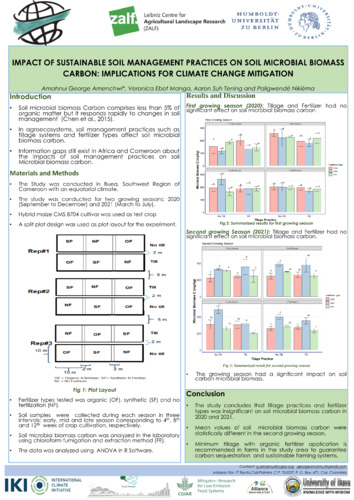Impact of sustainable soil management practices on soil microbial biomass carbon: Implications for climate change mitigation
Although soil microbial biomass (MBC) comprises less than 5% of soil organic matter, it responds rapidly to changes in soil management practices and, therefore, is generally used as early indicators of changes in soil carbon. The objective of this study was to evaluate the effects of tillage practices (conventional tillage and no-tillage) and fertiliser types (synthetic, organic, and no fertiliser) on soil MBC. The field experiment, located in Bue, Southwest region of Cameroon. The experiment was carried out in a split-plot design with three replications with tillage systems as main plots and fertiliser types as sub-plots. Soil samples were collected at 0–15 cm depth at an interval of 4 (early season), 8 (mid-season) and 12 (late season) weeks during the 2020 and 2021 minor and major growing seasons respectively, for the determination of soil MBC by the chloroform fumigation and extraction method. The findings of the study showed that the main effect of tillage practice and fertiliser types was unsignificant (p>0.05) in the 2020 and 2021 study season throughout the sampling period. Plots under zero tillage with control experiments (No.Till:CON) recorded the highest soil MBC in the 2020 season (201 kg-1 respectively) while in the 2021 season, plots under zero tillage with organic fertilisation (No.Till:ORG) recorded the highest (400.4 mg kg-1) soil MBC. Soil MBC was higher in the 2021 season than in the 2020 season. These findings suggest that the use of compost in combination with either conventional tillage or no-tillage in farms in the study area could potentially enhance soil MBC.

